.
MarkFL said:
My only motivation in using the definition is so that theists understand that when someone says they are an atheist, this doesn't necessarily mean the atheist is in the same boat regarding burden of proof.
.
Josiah said:
If one has no position - one is neutral - that's Agnosticism.
There are only 3 ways to deal with positions (which are NOUNS)
1. YES. Affirmed. "God IS"
2. NO. Denied. God is NOT"
3. NEUTRAL. Neither denied or affirmed, "final verdict is out," both positions are possible, neither is embraced (or denied).
IF one said, "I don't know" that IS the EXACT, literal meaning of "Agnostic." But it also means those who simply are neutral.
The rest is word games, semantic gymnastics, done for a reason. In this case, we've been told that the reason for the "STRIPPING" of meaning is so that there can be a double standard, a "bi-polar" approach to accountability and the "burden of proof", so that the Atheist can dodge the "burden of proof" he insists the Theist must provide, so that the Atheist can "jump ship" on that.
Thank you for telling us this "stripping" and the invention of this new 4th position comes from some person I can't find a thing about in 1888. But IMO, that doesn't make it right or good or even possible.
.
OK, so split your position (3) into two possible stances:
3a - Neutral but inclined to accept
3b - Neutral but inclined to reject
1. The NEUTRAL is the position of agnosticism. If one does not take a position, does not state an affirmation or denial of a position, they are - by definition - agnostic.
2. I suppose one could view one side or the other more "likely" and still be an agnostic. I raised this earlier (it was ignored) when I posted that while one is an agnostic on the issue of: There IS life on Mars or There is NOT life on Mars - neutral and thus agnostic - they may feel (as I do) that such seems likely and we should pursue the investigation of such, but as I pointed out (no one noticed), I am Agnostic on this (like almost every informed person I know or have heard of on this point). I'm an agnostic on this point because I hold both possibilities exist, so far the evidence for either is insufficient and I hold "the verdict is still out" - the classic, traditional definition of an Agnostic.
3. What is nonsensical, illogical and just plain WEIRD is to state that one is equally, concurrently, both Atheistic AND Agnostic. To use the Mars exmaple, to stated one's position as: "There is NO life on Mars I'm neutral on the question of whether there is life on Mars accepting both possibilities and denying neither." This newly invented position - invented by some guy in 1888 evidently to insure an absolute double standard in accountability - is a contradiction, nonsense, illogical.
4. Because you too see this newly created 4th position as impossible, it DOES raise the issue of WHY .... why would otherwise intelligent people NEED to INVENT this very new nonsensical position? THAT is what I kept asking (always ignored). Finally our friend Tigger (a former Atheist) responded to give his (rather stunning but very credible) theory. Mark ignored it for a long time until finally he appears to fully confirm it (see the quote at the top of this post, for example): It all has to do with creating two opposite burdens of proof - the Theist has a full burden of proof, but this new position enables one to deny the reality of the divine and SCREAM to the Theist "PROVE IT!!!!!!" holding Theist to a full burden of proof - but then the Atheist can dodge over to the Agnostic position and insist he has no burden of proof. Tigger was right all along..... I find all this not only nonsensical but intellectually dishonest.
5. IMO, this thread BEGAN with the implication that in an uber-philosophical sense..... in terms of absolute, objective PROOF ... that all are entirely forced to accept and cannot deny..... in
THAT sense.... there really are no Theist or Atheists (of course, in THAT sense there is no certainty AT ALL - about anything - I can't even prove to you or myself that I even exist!). The point was to indicate this absolute sense is always missing, in all positions (except having no position - agnosticism). I agreed with Mark on that point - indeed, we ALL walk by faith, we are ALL people who believe something...... (of course, Mark rejected this agreement). But obviously, I think we
all realize and admit,
NO ONE uses these terms in that radical absolute sense - either for our positions OR in our apologetics, our responsibility vis-a-vis the burden of proof. Theists NEVER claim or state that the divine is provable in that absolute sense (EVERYONE would accept such - they could do no other - if that were the case) and we don't even claim that our evidence is absolute. Nor do we demand the same for the Atheist. The whole point of the op, in my opinion, is irrelevant (except for radical nihilism and reason for suicide, lol). But.... why the very new invention this Bill guy in 1888? NOT to suggest this reality that NO ONE has this kind of ABSOLUTE PROOF - but to allow Atheists to evade the "burden of proof" they obsess that Theists do have.
- Josiah
.


